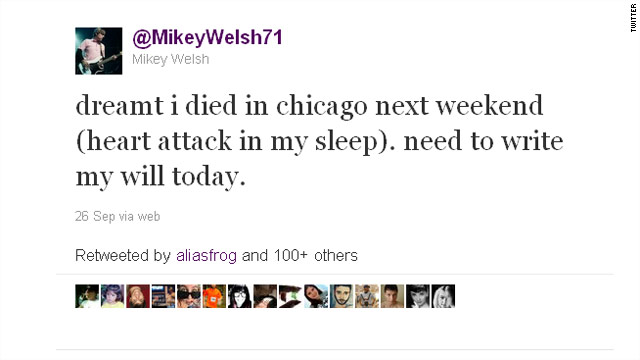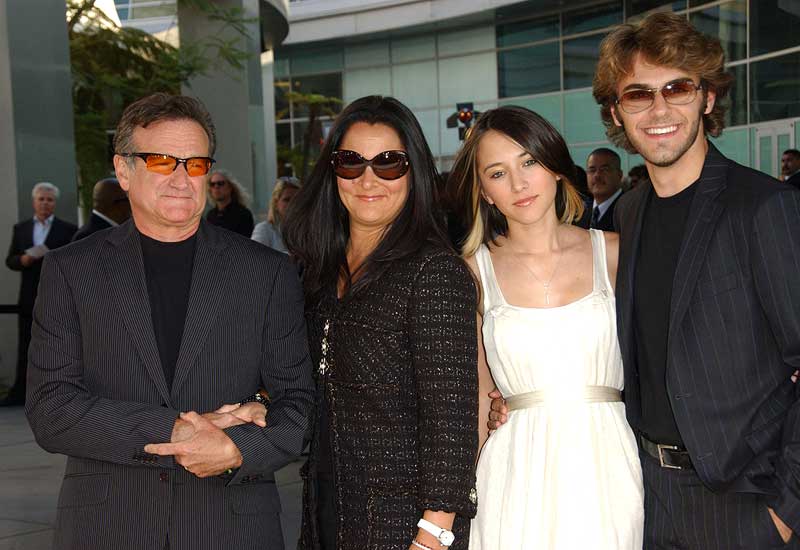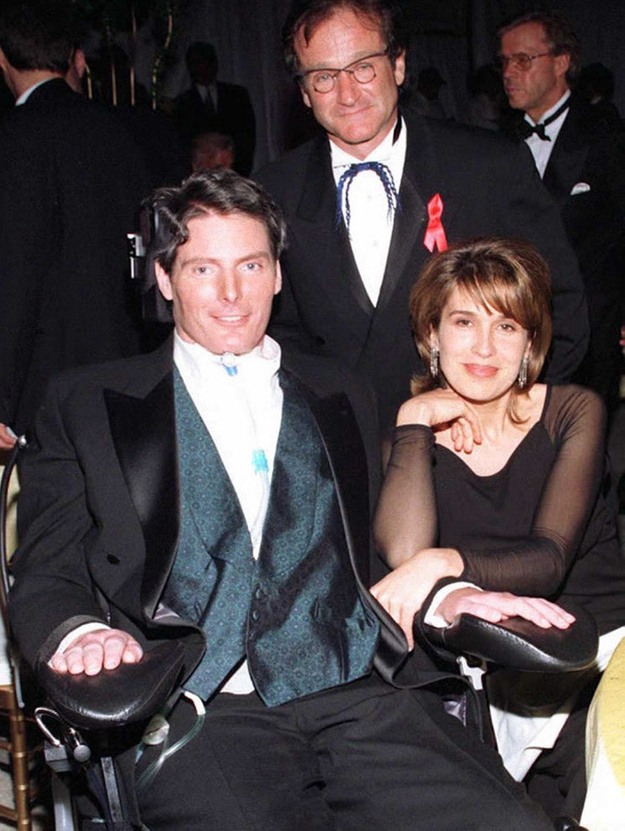Celebrity Death
Grief Shaming: Why some people believe your grief over Robin Williams is misguided
My social media feeds have been spattered with statuses such as this:
“People need to wake up! He was JUST a celebrity!”
Or this:
“Why are so many people grieving over Robin Williams when Mike Brown was shot and killed for NO REASON!!!”
And then there’s the complaint that we forget crimes against humanity, like those atrocities being committed by ISIS against the innocent:
“The media covers celebrity deaths, but they totally forget that ISIS is slaughtering children.”
And I admit, I’m guilty of the same type of grief shaming and grief measuring. There’s been a few times when I’ve walked into a nursing home, hospital or home to see the grandchildren and children weeping over the body of a 90+ year old deceased person. And I want to say, “You know last week I buried a 15 year old boy who was struck by a car … that family has a right to grieve, but this person that you’re crying over … this person has lived 90 full years of life.”
Or, something like this: “Most people never get to see their parents live into their 90s. You should be celebrating that fact that you shared so much time with your loved one. STAAAAPH CRYING!!!”
And, from a level of objectivity, I (we) are right.
I mean, have you read about the recent Mike Brown tragedy? An eighteen year old unarmed black male gunned down by a white cop in Ferguson, Missouri.
And the ISIS stories are so horrific that it’s difficult to recount. ISIS is slaughtering children. And turning other children into monsters.
ALL THIS IS GOING ON IN THE WORLD AND YOU’RE MOURNING THE DEATH OF A COMEDIAN??? A COMEDIAN WHO COMMITTED SUICIDE???
The problem with grief shaming and grief measuring is this: there isn’t objectivity.
See, grief is proportional to love and intimacy. The more you love someone and the closer you are to them, the more you grieve. And telling someone that their grief is misguided is as wrong as telling someone their love is misguided.
Sure, the death of a 90 year old isn’t as tragic as the death of a 15 year old, but that doesn’t make the grief for the 90 year old any less real or any less valid. You grieve because you love and we all love differently. We love different people. We love those people in different ways. And our attachments are as varied as we are unique. I’ve learned the grief NEVER deserves judgment, but it ALWAYS deserves compassion.
My friend Tracy, who has an incredible way with her words, wrote this:
I saw a thing today complaining about the focus on Robin Williams’ death instead of the horrible atrocities in Iraq and around the world. Can I tell you something? Mr. Williams’ death HAS affected me more deeply. Even if that makes me a bad person.
I think it’s because I understand something about depression and have no concept of being a refugee. I think it’s because I’ve considered suicide at one point in my life but I’ve never needed to climb into a rescue helicopter to escape genocide. I think it’s because I’ve been touched more than once by mental illness and addiction in the lives of those around me but I’ve never had to see a neighbor child cut in half. I think it’s because I can’t do absolutely anything at all about Iraq or Sudan or DRC, but I can look in the eyes of the people around me and make sure they are actually ok and not just pretending. Step up to my own war against profound and crushing grief and sadness. Do something small to release the stigma of mental illness in my own corner of the world.
I’m not one to really care much about celebrities and their divorces/affairs/babies/
movies/whatever, but this one hits me. And instead of lashing out at those who mourn a suicide by calling their attention to “more important” deaths, maybe we need to check in with the people who are mourning Mr. Williams and make sure they’re ok. (I’m ok, really. Thanks.)
Many of us grew up with Robin Williams.
He was the Genie in Aladdin that made us laugh.
He made us believe in the magic of Neverland.
Williams sparked our imagination in ‘Jumanji’.
He somehow softened the blow of divorce in Mrs. Doubtfire
And now, he’s making many of us reconsider our understanding of depression and suicide.
Instead of shaming and measuring other people’s grief, isn’t it more helpful if we open up a space in our hearts for compassion and empathy? And maybe, if we show others empathy for their grief, they will in turn show empathy for ours.
The key to solving problems like ISIS and the injustice of the Mike Brown tragedy doesn’t start with shame and judgment. The key to solving problems big and small starts with showing compassion. It is love, after all, and not judgment, that covers a multitude of sins.
Robin Williams’ Suicide: Why I hurt for the Williams family
Yesterday I wrote a piece entitled, “Robin Williams: Finding the Silver Lining“. I rarely address celebrity deaths on my blog, but I found Williams’ death affected me more than I expected.
This morning I woke up and as I scrolled through my news feed I was surprised to see the details of Robin’s death trumpeted on nearly every news outlet. And again I found myself strangely affected. So I wrote this piece — from my perspective as a funeral director — on why Robin’s death, more than most, needs privacy.
Church funerals often cause a proxemics dilemma. The dilemma comes into play in rare circumstances when the family wants the open casket in the front of church sanctuary.
Sometimes, when the time comes for the family to say their last good-byes before the lid’s closed, they have to do something incredibly intimate and tearful in a public setting, with often a hundred or so onlookers watching as they cover their deceased loved one with the blanket, give a final kiss good-bye and say their last “I love you.”
The way we solve the dilemma is by having the pall bearers come forward and surround the family, creating a human wall so to speak, which allows the family to let all their humanity out before the lid is closed.
Celebrity deaths create the same dilemma. Grief that is meant to be private is watched and consumed by the public. Ideas, thoughts and feelings that are meant to be processed within the context of family and friends are now processed within the context of the public eye.
For instance:
We, the public, have also been told the manner of Williams’ death (suicide). I’ve been in this business for years and we’ve buried many people who have committed suicide without the public EVER knowing. If the family we were serving wished for it to remain a private topic, it was kept private by us and by the authorities.
Suicide is SO complex. It’s not easy for anyone to understand and so there’s times when privacy is the most psychologically healthy way to approach a death by suicide. Because while suicide isn’t easy to understand, the VERY LAST THING the survivors need to experience is judgment of any kind from others.
This approach from Shawna Morrissey’s blog is one of the best ways to understand suicide. Shawna writes,
Twelve years ago this month, I lost my Uncle Jay to suicide.
At his funeral, Jay’s bishop addressed us. The words he spoke are burned into my mind. He said, “I feel impressed to tell you that Jay spent his life struggling to survive. Suicide was not a choice he made, but rather a choice he happened onto when his pain was greater than his ability to cope.”
This man, who took his own life, was a survivor in every sense of the word.
I imagine that such is true of many who leave the world in this way.
But not everyone is so compassionate towards those who take their own life.
Not only have we been told the manner of Williams’ death, we’ve also been told the cause (hanging).
Why? Why? Why have we been told this?
Suicide through overdose, gunshot wound and carbon monoxide asphyxiation are considerably timid forms of suicide when compared with hanging.
Overdose, gunshot wounds and carbon monoxide are one step methods that sometimes result from impulsive moments of considerable darkness. But, hanging oneself. This is a whole different method of suicide. In many ways, it is the most premeditated form of self-murder. Suicide by hanging is a statement suicide. Suicide by overdose and gunshot is usually an “I just want to end it” method … not so with hanging. And all this gives more reasons why Williams’ death is so complex and complicated.
Grief is sacred.
This sacredness of grief is the reason so many of us hate the Westboro picketers, who picket the funerals of fallen soldiers, and any other funeral that can grab them some limelight. We dislike what they’re doing because it transgresses one of the most sacred aspects of both our love and our humanity: the grief that comes from the loss of personal love.
I believe transparency is helpful. But, in times like this, privacy is what Robin’s family and friends need and deserve. And I wish they would have received it. I, for one, hurt for his wife and kids and hope they find the space, compassion and love they so desperately need.
Robin Williams: Finding the Silver Lining
Most celebrity deaths don’t affect me too much. For some reason Robin Williams’ death has. When I first heard of his death I nearly broke into tears, prompting me to immediately reflect on why his passing elicited such an emotional response.
As was public knowledge, Williams suffered from severe depression, which caused him to both cope through various forms of substances, but it also seemed to inspire his comedic genius. In fact, I always had the sense that his comedy somehow poured out of a deep current of pain … that the laughter he inspired was his way of brightening the darkness he saw in the world. That in his depression, he fought back by inspiring laughter. And I think that’s why so many — including myself — loved him. With Robin Williams, you just had the feeling that his humor was deeper than the Vince Vaughns or the Jim Carreys of the world. You had the feeling that his humor was genuinely meant to inspire your happiness … that his desire to make you smile was inspired by his pain.
Here’s a small story that acts as an example. Robin Williams and Christopher Reeve (of Superman fame) were roommates at Juilliard where they studied drama and became lifelong friends. After Reeve had his devastating accident (that caused him to be a quadriplegic) and Reeve was in the hospital preparing for a surgery, this happened.
Reeve was approaching operation to reattach his skull to his spine (June 1995). Reeve recollected that the surgery “was frightening to contemplate. … I already knew that I had only a fifty-fifty chance of surviving the surgery. … Then, at an especially bleak moment, the door flew open and in hurried a squat fellow with a blue scrub hat and a yellow surgical gown and glasses, speaking in a Russian accent.” The man announced that he was a proctologist and was going to perform a rectal exam on Reeve. It was Robin Williams, reprising his character from the film Nine Months. Reeve wrote: “For the first time since the accident, I laughed. My old friend had helped me know that somehow I was going to be okay.”
For those of us (like myself) who struggle with depression, some days it can be hard just to get out of bed. But Robin Williams — somehow — in his pain inspired millions to laughter. Thank you, Robin, for making the world brighter. Thank you for finding the silver lining.
Mikey Welsh Predicts His Own Death
Have you ever had a horrible dream or premonition that you were going to die?
If you were able to answer that question, thankfully the premonition has yet to come true.
99.99% of the time those premonitions don’t come true, unless you’re Mikey Welsh.
Mikey Welsh was the former bassist for Weezer (of “The Sweater Song” fame) and he tweeted the following on September 26:

On October 8th he died in his sleep … at Chicago … from an overdose … that supposedly threw his heart into cardiac arrest.
Scary, huh?
Or is it.
Would you, if you could, like to know your death date?
I have a buddy and his grandfather supposedly has such premonitions. He’s predicted five deaths within his family; and although he didn’t know who was going to die, he did know THAT someone was going to die. Now, apparently, he let’s everyone know when the premonitions come to him … gives everyone a nice, scary, keep you on the edge of your seat, you might be next, forewarning.
I’ve often thought that if euthanasia becomes uber popular and easily accessible with no terminal rational that we could fix our death dates and instead of funerals we could have massive going away (permanently) parties.
Did Mikey Predict his own death?
Or did he just take his death into his own hands? I don’t know … we’ll let the medical examiner make that determination.
But, and here’s the $1000 question: If you could control when you die (within reason), would you?








